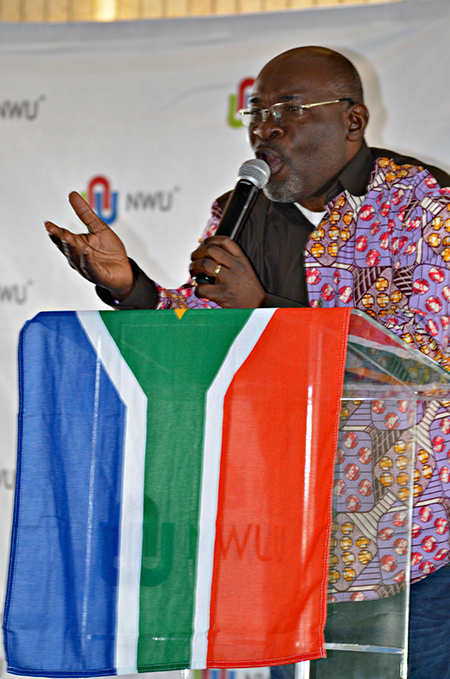In his presentation, Dr Taty Dekoke elaborated on the findings of a research study conducted by himself and Prof Susan Coetzee-Van Rooy – both affiliated to the School of Languages on the campus in Vanderbijlpark. The study focused on multilingualism and social cohesion within South Africa.
According to Dr Dekoke, the African continent boasts with a long-standing history of multilingualism. He explained that before the partition of Africa in the 1880’s and the advent of colonialism, there were not hard and fast borders dividing ethnolinguistic groups in Africa. The “national divisions” were based on settlements of people and by means of natural geographical features. It is according to Dr Dekoke to note that early settlements were often shifting and nomadic in nature. “Despite the complex nature of multilingualism at that time, a range of communication networks existed through social, economic and military links. This range of communication networks facilitated communication and developed individuals with multilingual abilities,” says Dr Dekoke.
Multilingual ethos
Several research studies support Dr De Koke and Prof Coetzee-Van Rooy’s research findings that in Africa a person who speaks several languages is to be regarded as a better integrated citizen than one that is only proficient in one language. “The multilingual ethos advocates for the acceptance and recognition of linguistic diversity,” says Dr De Koke and explains that it furthermore ensures social cohesion and avoid the disintegration of societies. He continues by stating that the multilingual ethos stresses the commonalities and the complementariness of languages within communities and in a given situation. From this perspective, language ownership cannot be claimed by any single social group.
Local research with a continental impact
The question at the heart of Dr De Koke and Prof Coetzee-Van Rooy’s research is: Why must South Africans acquaint themselves with more than one language? One of the most important findings of the study is that participants believe that South Africans should be multilingual so that there can be unity or social cohesion among all South Africans.
The research data (collected over a period of six years) indicates several reasons – as voiced by the research participants – as to why South Africans should be multilingual. Some of the reasons quoted, include:
- “We are a rainbow nation and the only way we can unite is through knowing other peoples languages.”
- “South Africa is a diverse country in culture and languages so I think it is vitally important to know all these languages in order to stand in unity.”
- “The introduction of democracy has made it possible for all races to interact. Knowing more indigenous languages makes communication better without anyone feeling uncomfortable.”
- “Learning other languages helps you to communicate with most people which is an important factor in unity.”
- “Besides for communication at a broader level I believe that, this is where diversity and unity conjoin at best.”
According to Dr De Koke and Prof Coetzee-Van Rooy the main finding of their research project is that it is important to learn additional languages because it enables communication through which one can build improved relationships and understanding that directly facilitates unity and social cohesion.

Dr De Koke on stage presenting a talk on multilingualismm during the recent Africa Day celebrations.
